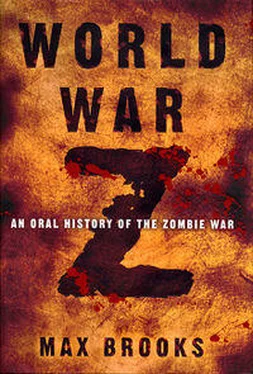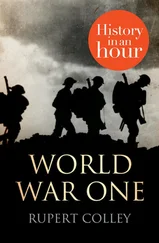Your own what?
Our proposal to the White House. We outlined a fully comprehensive program, not only to eliminate the threat within the United States, but to roll back and contain it throughout the entire world.
What happened?
The White House loved Phase One. It was cheap, fast, and if executed properly, 100 percent covert. Phase One involved the insertion of Special Forces units into infested areas. Their orders were to investigate, isolate, and eliminate.
Eliminate?
With extreme prejudice.
Those were the Alpha teams?
Yes, sir, and they were extremely successful. Even though their battle record is sealed for the next 140 years, I can say that it remains one of the most outstanding moments in the history of America’s elite warriors.
So what went wrong?
Nothing, with Phase One, but the Alpha teams were only supposed to be a stopgap measure. Their mission was never to extinguish the threat, only delay it long enough to buy time for Phase Two.
But Phase Two was never completed.
Never even begun, and herein lies the reason why the American military was caught so shamefully unprepared.
Phase Two required a massive national undertaking, the likes of which hadn’t been seen since the darkest days of the Second World War. That kind of effort requires Herculean amounts of both national treasure and national support, both of which, by that point, were nonexistent. The American people had just been through a very long and bloody conflict. They were tired. They’d had enough. Like the 1970s, the pendulum was swinging from a militant stance to a very resentful one.
In totalitarian regimes-communism, fascism, religious fundamentalism-popular support is a given. You can start wars, you can prolong them, you can put anyone in uniform for any length of time without ever having to worry about the slightest political backlash. In a democracy, the polar opposite is true. Public support must be husbanded as a finite national resource. It must be spent wisely, sparingly, and with the greatest return on your investment. America is especially sensitive to war weariness, and nothing brings on a backlash like the perception of defeat. I say “perception” because America is a very all-or-nothing society. We like the big win, the touchdown, the knockout in the first round. We like to know, and for everyone else to know, that our victory wasn’t only uncontested, it was positively devastating. If not. . . well. . . look at where we were before the Panic. We didn’t lose the last brushfire conflict, far from it. We actually accomplished a very difficult task with very few resources and under extremely unfavorable circumstances. We won, but the public didn’t see it that way because it wasn’t the blitzkrieg smackdown that our national spirit demanded. Too much time had gone by, too much money had been spent, too many lives had been lost or irrevocably damaged. We’d not only squandered all our public support, we were deeply in the red.
Think about just the dollar value of Phase Two. Do you know the price tag of putting just one American citizen in uniform? And I don’t just mean the time that he’s actively in that uniform: the training, the equipment, the food, the housing, the transport, the medical care. I’m talking about the long-term dollar value that the country, the American taxpayer, has to shell out to that person for the rest of their natural life. This is a crushing financial burden, and in those days we barely had enough funding to maintain what we had.
Even if the coffers hadn’t been empty, if we’d had all the money to make all the uniforms we needed to implement Phase Two, who do you think we could have conned into filling them? This goes to the heart of America’s war weariness. As if the “traditional’’ horrors weren’t bad enough-the dead, the disfigured, the psychologically destroyed-now you had a whole new breed of difficulties, “The Betrayed.” We were a volunteer army, and look what happened to our volunteers. How many stories do you remember about some soldier who had his term of service extended, or some ex-reservist who, after ten years of civilian life, suddenly found himself recalled into active duty? How many weekend warriors lost their jobs or houses? How many came back to ruined lives, or, worse, didn’t come back at all? Americans are an honest people, we expect a fair deal. I know that a lot of other cultures used to think that was naive and even childish, but it’s one of our most sacred principles. To see Uncle Sam going back on his word, revoking people’s private lives, revoking their freedom …
After Vietnam, when I was a young platoon leader in West Germany, we’d had to institute an incentives program just to keep our soldiers from going AWOL. After this last war, no amount of incentives could fill our depleted ranks, no payment bonuses or term reductions, or online recruiting tools disguised as civilian video games. This generation had had enough, and that’s why when the undead began to devour our country, we were almost too weak and vulnerable to stop them.
I’m not blaming the civilian leadership and I’m not suggesting that we in uniform should be anything but beholden to them. This is our system and it’s the best in the world. But it must be protected, and defended, and it must never again be so abused.
Vostok Station: Antarctica
[In prewar times, this outpost was considered the most remote on Earth. Situated near the planet’s southern geomagnetic pole, atop the four-kilometer ice crust of Lake Vostok, temperatures here have been recorded at a world record negative eighty-nine degrees Celsius, with the highs rarely reaching above negative twenty-two. This extreme cold, and the fact that overland transport takes over a month to reach the station, were what made Vostok so attractive to Breckinridge “Breck” Scott.
We meet in “The Dome,” the reinforced, geodesic greenhouse that draws power from the station’s geothermal plant. These and many other improvements were implemented by Mister Scott when he leased the station from the Russian government. He has not left it since the Great Panic.]
Do you understand economics? I mean big-time, prewar, global capitalism. Do you get how it worked? I don’t, and anyone who says they do is full of shit. There are no rules, no scientific absolutes. You win, you lose, it’s a total crapshoot. The only rule that ever made sense to me I learned from a history, not an economics, professor at Wharton. “Fear,” he used to say, “fear is the most valuable commodity in the universe.” That blew me away. “Turn on the TV,” he’d say. “What are you seeing? People selling their products? No. People selling the fear of you having to live without their products.” Fuckin’ A, was he right. Fear of aging, fear of loneliness, fear of poverty, fear of failure. Fear is the most basic emotion we have. Fear is primal. Fear sells. That was my mantra. “Fear sells.”
When I first heard about the outbreaks, back when it was still called African rabies, I saw the opportunity of a lifetime. I’11 never forget that first report, the Cape Town outbreak, only ten minutes of actual reporting then a full hour of speculating about what would happen if the virus ever made it to America. God bless the news. I hit speed dial thirty seconds later, I met with some of my nearest and dearest. They’d all seen the same report. I was the first one to come up with a workable pitch: a vaccine, a real vaccine for rabies. Thank God there is no cure for rabies. A cure would make people buy it only if they thought they were infected. But a vaccine! That’s preventative! People will keep taking that as long as they’re afraid it’s out there!
We had plenty of contacts in the biomed industry, with plenty more up on the Hill and Penn Ave. We could have a working proto in less than a month and a proposal written up within a couple of days. By the eighteenth hole, it was handshakes all around.
Читать дальше












